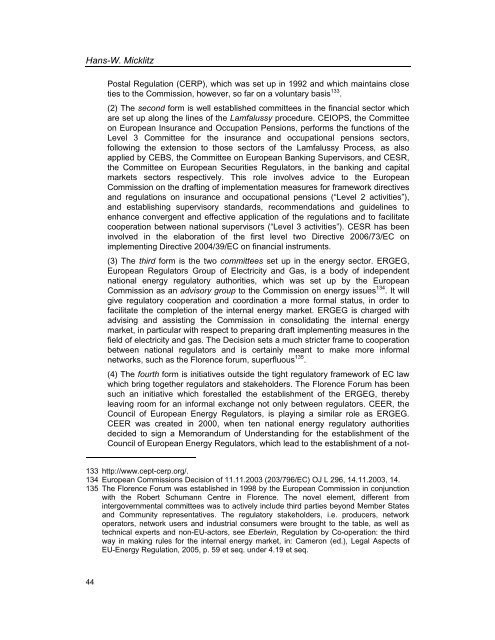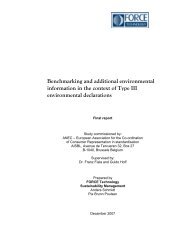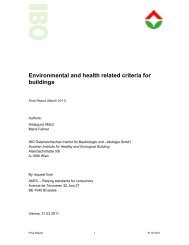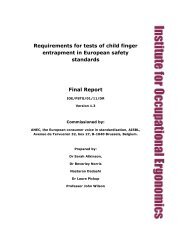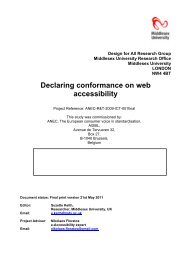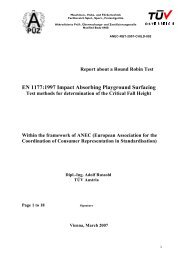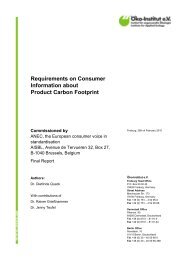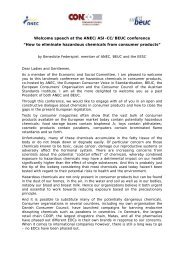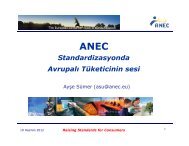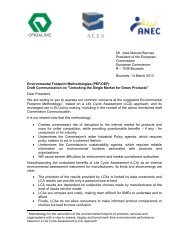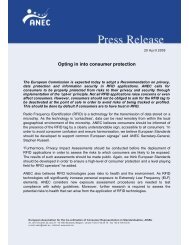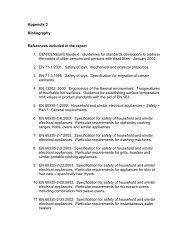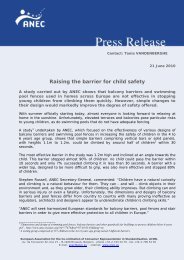Services Standards: Defining the Core Consumer Elements ... - ANEC
Services Standards: Defining the Core Consumer Elements ... - ANEC
Services Standards: Defining the Core Consumer Elements ... - ANEC
You also want an ePaper? Increase the reach of your titles
YUMPU automatically turns print PDFs into web optimized ePapers that Google loves.
Hans-W. Micklitz<br />
Postal Regulation (CERP), which was set up in 1992 and which maintains close<br />
ties to <strong>the</strong> Commission, however, so far on a voluntary basis 133 .<br />
(2) The second form is well established committees in <strong>the</strong> financial sector which<br />
are set up along <strong>the</strong> lines of <strong>the</strong> Lamfalussy procedure. CEIOPS, <strong>the</strong> Committee<br />
on European Insurance and Occupation Pensions, performs <strong>the</strong> functions of <strong>the</strong><br />
Level 3 Committee for <strong>the</strong> insurance and occupational pensions sectors,<br />
following <strong>the</strong> extension to those sectors of <strong>the</strong> Lamfalussy Process, as also<br />
applied by CEBS, <strong>the</strong> Committee on European Banking Supervisors, and CESR,<br />
<strong>the</strong> Committee on European Securities Regulators, in <strong>the</strong> banking and capital<br />
markets sectors respectively. This role involves advice to <strong>the</strong> European<br />
Commission on <strong>the</strong> drafting of implementation measures for framework directives<br />
and regulations on insurance and occupational pensions (“Level 2 activities”),<br />
and establishing supervisory standards, recommendations and guidelines to<br />
enhance convergent and effective application of <strong>the</strong> regulations and to facilitate<br />
cooperation between national supervisors (“Level 3 activities”). CESR has been<br />
involved in <strong>the</strong> elaboration of <strong>the</strong> first level two Directive 2006/73/EC on<br />
implementing Directive 2004/39/EC on financial instruments.<br />
(3) The third form is <strong>the</strong> two committees set up in <strong>the</strong> energy sector. ERGEG,<br />
European Regulators Group of Electricity and Gas, is a body of independent<br />
national energy regulatory authorities, which was set up by <strong>the</strong> European<br />
Commission as an advisory group to <strong>the</strong> Commission on energy issues 134 . It will<br />
give regulatory cooperation and coordination a more formal status, in order to<br />
facilitate <strong>the</strong> completion of <strong>the</strong> internal energy market. ERGEG is charged with<br />
advising and assisting <strong>the</strong> Commission in consolidating <strong>the</strong> internal energy<br />
market, in particular with respect to preparing draft implementing measures in <strong>the</strong><br />
field of electricity and gas. The Decision sets a much stricter frame to cooperation<br />
between national regulators and is certainly meant to make more informal<br />
networks, such as <strong>the</strong> Florence forum, superfluous 135 .<br />
(4) The fourth form is initiatives outside <strong>the</strong> tight regulatory framework of EC law<br />
which bring toge<strong>the</strong>r regulators and stakeholders. The Florence Forum has been<br />
such an initiative which forestalled <strong>the</strong> establishment of <strong>the</strong> ERGEG, <strong>the</strong>reby<br />
leaving room for an informal exchange not only between regulators. CEER, <strong>the</strong><br />
Council of European Energy Regulators, is playing a similar role as ERGEG.<br />
CEER was created in 2000, when ten national energy regulatory authorities<br />
decided to sign a Memorandum of Understanding for <strong>the</strong> establishment of <strong>the</strong><br />
Council of European Energy Regulators, which lead to <strong>the</strong> establishment of a not-<br />
133 http://www.cept-cerp.org/.<br />
134 European Commissions Decision of 11.11.2003 (203/796/EC) OJ L 296, 14.11.2003, 14.<br />
135 The Florence Forum was established in 1998 by <strong>the</strong> European Commission in conjunction<br />
with <strong>the</strong> Robert Schumann Centre in Florence. The novel element, different from<br />
intergovernmental committees was to actively include third parties beyond Member States<br />
and Community representatives. The regulatory stakeholders, i.e. producers, network<br />
operators, network users and industrial consumers were brought to <strong>the</strong> table, as well as<br />
technical experts and non-EU-actors, see Eberlein, Regulation by Co-operation: <strong>the</strong> third<br />
way in making rules for <strong>the</strong> internal energy market, in: Cameron (ed.), Legal Aspects of<br />
EU-Energy Regulation, 2005, p. 59 et seq. under 4.19 et seq.<br />
44


